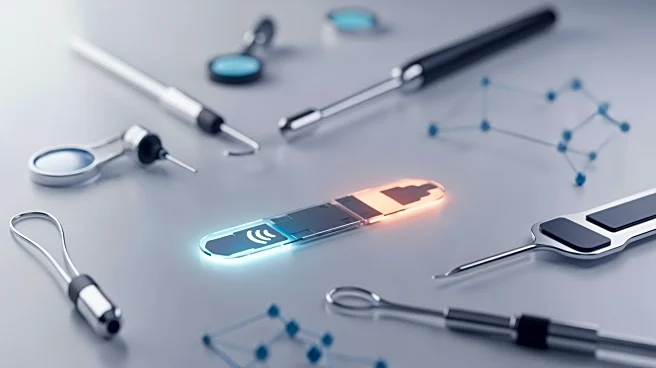What's Happening?
Recent advancements in NFC/RFID technology are paving the way for innovative applications in the biomedical field. These systems integrate sensing and wireless power transfer through electromagnetic coupling,
forming a distributed RLC resonant network. The technology allows for environment-responsive components in tag antennas, which modulate circuit parameters in response to external stimuli like temperature or pressure. This modulation results in resonant frequency deviations that can be captured and demodulated into sensor data. Additionally, NFC/RFID systems enable optimized power transfer, converting induced AC power into regulated DC output for battery-less sensors and microcontrollers. The focus is on miniaturization, transmission efficiency, flexibility, and biocompatibility, essential for implantable and wearable applications. Challenges remain in balancing antenna size with transmission efficiency and ensuring comfort and safety in practical use.
Why It's Important?
The integration of NFC/RFID technology in biomedical applications holds significant potential for enhancing healthcare delivery. By enabling real-time monitoring and data collection, these systems can improve patient outcomes through more accurate diagnostics and personalized treatment plans. The miniaturization and flexibility of these devices make them suitable for continuous monitoring, offering a non-invasive solution for patients. Furthermore, the biocompatibility and biodegradability of materials used in these devices reduce the risk of adverse reactions, making them safer for long-term use. This technology could lead to a shift in how healthcare providers approach patient care, emphasizing preventive measures and early intervention.
What's Next?
Continued research and development are expected to focus on overcoming existing challenges, such as improving transmission efficiency and ensuring complete flexibility and comfort in wearable devices. Innovations in material science may lead to more cost-effective solutions, making these technologies accessible to a broader range of healthcare providers. As the technology matures, regulatory bodies may establish new standards to ensure safety and efficacy, potentially accelerating the adoption of NFC/RFID-enabled devices in clinical settings.
Beyond the Headlines
The ethical implications of using NFC/RFID technology in healthcare include concerns about data privacy and security. As these devices collect sensitive health information, robust measures must be in place to protect patient data from unauthorized access. Additionally, the widespread adoption of these technologies could lead to disparities in healthcare access, with rural or underserved communities potentially facing challenges in obtaining these advanced solutions.












